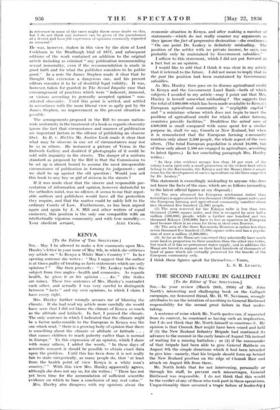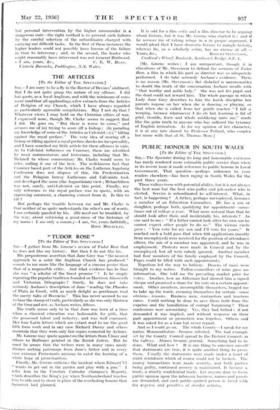THE SECOND FAILURE IN GALLIPOLI
[To the Editor of TUE SPECTATOR.] SIR,—In your review (March 20th, 1936) of Mr. John North's interesting and challenging book on the Gallipoli campaign, my honoured friend, Mr. H. W. Nevinson, wrongly attributes to me the intention of ascribing to General Birdwood responsibility for the second great failure in that under- taking.
A sentence of mine which Mr. North quotes can, if separated from its context, be construed as having such an implication, but I do not think that Mr. North himself so construes if. My opinion is that Chunuk Bair might have been seized and held if (1) the New Zealand Infantry Brigade had continued its advance to the summit in the early hours of August 7th instead of waiting for a missing battalion ; or (2) if the commander of that brigade had been able to give General Baldwin on
August 8th the simple directions which it had been intended to give him—namely, that his brigade should form up behind the New Zealand position on the edge of Chunuk Bair and attack on August 9th from there.
Mr. North holds that for not intervening, personally or through his staff, to prevent such miscarriages, General Birdwood was responsible. I do not think that this would be the verdict of any of those who took part in these operations.
Unquestionably there occurred a tragic failure of leadership I but personal intervention by the higher commander is a' dangerous cure—the right method is to prevent such failures by the careful selection of the subordinates charged with carrying out difficult tasks. In the first of these instances the higher leaders could not possibly have known of the failure in time to intervene ; and, in the second, the leader who
► night reasonably have intervened was not General Birdwood.



















































 Previous page
Previous page